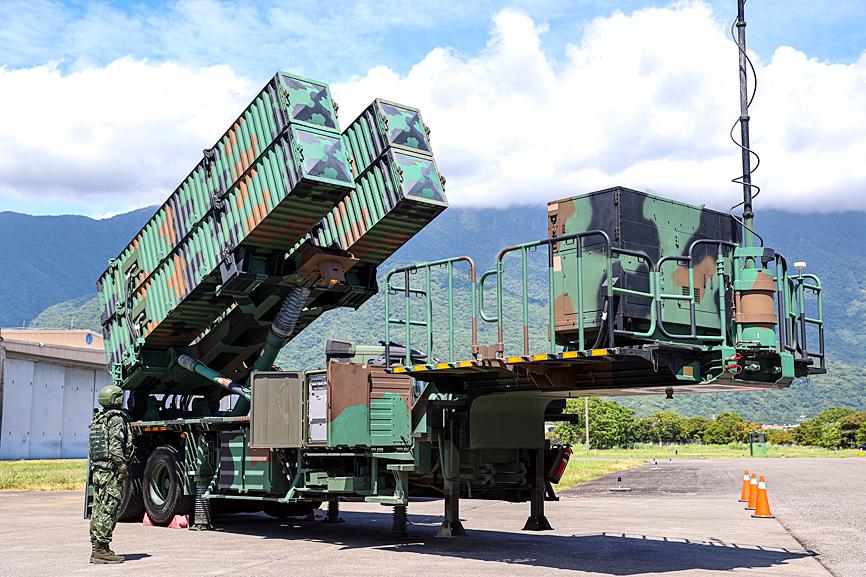The Hsiung Feng III missile project’s former chief engineer, Chang Cheng (張誠), has said that the military needs to extend the altitude of the Tien Kung III air-defense missile to effectively counter any threats from China.
In response to the rising military threat from China, the Ministry of National Defense has taken steps to increase missile production, raising production of the Tien Kung III missile from 48 units to 96 units per year, a defense official speaking on condition of anonymity said yesterday.
China’s live-fire missile drills earlier this month showed that the Tien Kung III air-defense missile cannot reach the altitude necessary to intercept some Chinese strikes, Chang wrote on Facebook on Tuesday.

Photo: CNA
The Chinese People’s Liberation Army (PLA) fired four Dongfeng-17 ballistic missiles into strategically key waters off eastern Taiwan where Taiwanese warships shelter and US forces would travel to counter a Chinese invasion, Chang said.
The missiles likely flew over Taiwan proper at an altitude of about 100km, the height they should reach when traveling the last one-third of their effective range, while the extended-range Tien Kung III has a service ceiling of 70km, he said.
This means the country’s premier air defense missile is incapable of shooting down Chinese ballistic missiles, he said.
“To intercept the PLA’s guided missiles at altitudes of 100km or more, the Chungshan Institute [of Science and Technology] would have to create a system capable of reaching 150km, similar to the US’ Terminal High Altitude Area Defense system,” Chang said.
The navy and the institute should join forces to design surface warships with an advanced air defense capability, mirroring that of the US Navy’s Advanced Electronic Guidance and Instrumentation System (AEGIS), he said.
AEGIS-equipped ships can defend a fleet from ballistic missiles by utilizing Standard Missile-2s and Standard Missile-6s, which are capable of defeating ballistic missiles, Chang said, adding that Hai Kung III missiles, which are close to being completed by the institute, could be used on such a warship.
A vertical launch system should also be built so that the theoretical warships could fire Hsiung Sheng missiles that have been designed for naval use, he said.
The anonymous defense official yesterday said that the extended-range Tien Kung III’s maximum interception height is probably 45km.
The missile launches seen on Thursday near the institute’s Jioupeng Military Base in Pingtung County’s Manjhou Township (滿州) were likely a test in which two extended-range missiles were fired at a simulated ballistic missile, the official said.
The military plans to establish 17 launch sites for the Tien Kung III missile before 2026 as part of Taiwan’s “porcupine” defense strategy, they said, adding that similar measures are being taken for anti-ship missiles.
The porcupine strategy refers to an asymmetric strategy that aims to make a territory difficult and costly to invade, which in part involves using anti-aircraft, anti-ship and anti-tank missiles against an opposing force’s large and expensive weapons platforms.

INVESTIGATION: The case is the latest instance of a DPP figure being implicated in an espionage network accused of allegedly leaking information to Chinese intelligence Democratic Progressive Party (DPP) member Ho Jen-chieh (何仁傑) was detained and held incommunicado yesterday on suspicion of spying for China during his tenure as assistant to then-minister of foreign affairs Joseph Wu (吳釗燮). The Taipei District Prosecutors’ Office said Ho was implicated during its investigation into alleged spying activities by former Presidential Office consultant Wu Shang-yu (吳尚雨). Prosecutors said there is reason to believe Ho breached the National Security Act (國家安全法) by leaking classified Ministry of Foreign Affairs information to Chinese intelligence. Following interrogation, prosecutors petitioned the Taipei District Court to detain Ho, citing concerns over potential collusion or tampering of evidence. The

Seventy percent of middle and elementary schools now conduct English classes entirely in English, the Ministry of Education said, as it encourages schools nationwide to adopt this practice Minister of Education (MOE) Cheng Ying-yao (鄭英耀) is scheduled to present a report on the government’s bilingual education policy to the Legislative Yuan’s Education and Culture Committee today. The report would outline strategies aimed at expanding access to education, reducing regional disparities and improving talent cultivation. Implementation of bilingual education policies has varied across local governments, occasionally drawing public criticism. For example, some schools have required teachers of non-English subjects to pass English proficiency

‘FORM OF PROTEST’: The German Institute Taipei said it was ‘shocked’ to see Nazi symbolism used in connection with political aims as it condemned the incident Sung Chien-liang (宋建樑), who led efforts to recall Democratic Progressive Party (DPP) Legislator Lee Kun-cheng (李坤城), was released on bail of NT$80,000 yesterday amid an outcry over a Nazi armband he wore to questioning the night before. Sung arrived at the New Taipei City District Prosecutors’ Office for questioning in a recall petition forgery case on Tuesday night wearing a red armband bearing a swastika, carrying a copy of Adolf Hitler’s Mein Kampf and giving a Nazi salute. Sung left the building at 1:15am without the armband and apparently covering the book with a coat. This is a serious international scandal and Chinese

TRADE: The premier pledged safeguards on ‘Made in Taiwan’ labeling, anti-dumping measures and stricter export controls to strengthen its position in trade talks Products labeled “made in Taiwan” must be genuinely made in Taiwan, Premier Cho Jung-tai (卓榮泰) said yesterday, vowing to enforce strict safeguards against “origin laundering” and initiate anti-dumping investigations to prevent China dumping its products in Taiwan. Cho made the remarks in a discussion session with representatives from industries in Kaohsiung. In response to the US government’s recent announcement of “reciprocal” tariffs on its trading partners, President William Lai (賴清德) and Cho last week began a series of consultations with industry leaders nationwide to gather feedback and address concerns. Taiwanese and US officials held a videoconference on Friday evening to discuss the